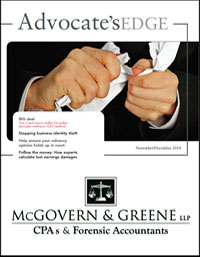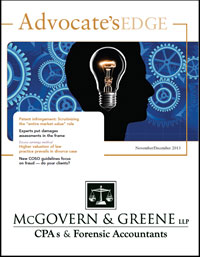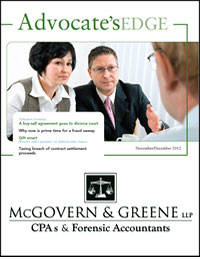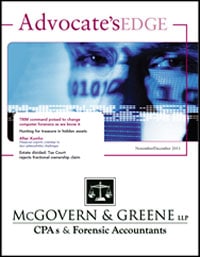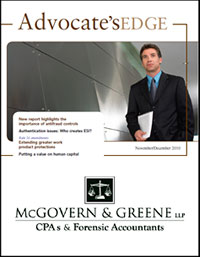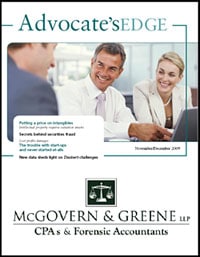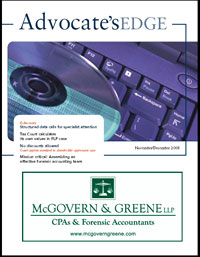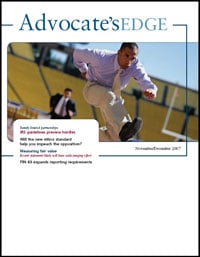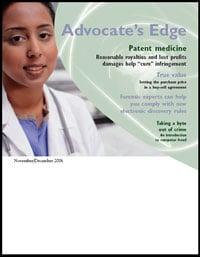Advocate’s Edge
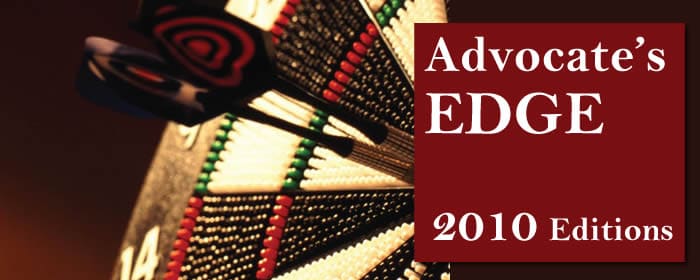
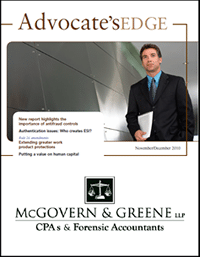 NOV/DEC 2010 Issue of Advocate’s Edge
NOV/DEC 2010 Issue of Advocate’s Edge
New report highlights the importance of antifraud controls
Employee fraud is one of the most significant threats to profitability — and the recently released report from the Association of Certified Fraud Examiners reinforces the severity of the threat. This article looks at some of the report’s findings regarding effective antifraud controls. A sidebar explains why one of the most effective antifraud tools is the surprise audit.
Authentication issues: Who creates ESI?
Like all evidence, electronically stored information (ESI) must be authenticated before a court will admit it as evidence, and one of the threshold steps is establishing its owner/creator. Because electronic documents are often passed around to others for revision, it can be difficult to pin down ESI authorship. This article summarizes an industry group’s research that could help attorneys determine whether a piece of ESI will be acceptable in court.
Rule 26 amendments
Extending greater work product protections
The first amendments since 1993 to the expert provisions of Federal Rules of Civil Procedure Rule 26 are scheduled to take effect Dec. 1, 2010. They were proposed largely in reaction to certain practices that critics argued reduced the effectiveness of expert work. This article explains how the new amendments extend work product protections to the discovery of testifying experts’ draft reports — with three critical exceptions.
Putting a value on human capital
Clients may not immediately think of employees as assets with a financial value, but human capital is a quantifiable — and critical — part of a business’s worth. Companies may need a professional valuator to quantify human capital for a variety of reasons, including litigation. This article discusses three different approaches to doing so.
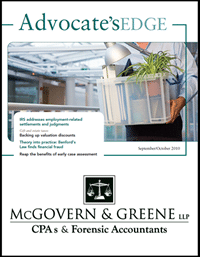 SEP/OCT 2010 Issue of Advocate’s Edge
SEP/OCT 2010 Issue of Advocate’s Edge
IRS addresses employment-related settlements and judgments
As attorneys litigate and settle an increasing number of employment-related lawsuits, certain questions related to the taxability of settlements and judgments commonly arise. A recent IRS memo may clarify some matters for both sides in employment disputes. This article looks at income and employment tax consequences of employment-related settlements and judgments, including the allocation of funds and treatment of back pay and attorneys’ fees. A sidebar shows how to determine the components of a settlement or judgment.
Gift and estate taxes
Backing up valuation discounts
Regardless of whether tax rates and exemptions change, valuation discounts probably will continue to play a significant role in the ultimate tax liabilities that taxpayers shoulder. Establishing the appropriate discounts can prove complicated, though, particularly when dealing with interests that don’t have a ready market. This article examines the tools valuators use to address this problem, such as discounts for lack of marketability, restricted stock studies, pre-IPO studies, and lack-of-control or minority discounts.
Theory into practice: Benford’s Law finds financial fraud
Benford’s Law is a relatively old statistical precept regarding the frequency of certain numbers in random data sets. But only in recent years has it become effective in detecting fraud, thanks to technological advances. This article explains how, informed by Benford’s Law, fraud experts use spreadsheet software to identify questionable numbers and suspicious activities. Often, experts spot possible financial manipulation that would be invisible to the naked eye.
Reap the benefits of early case assessment
Attorneys can help clients manage their litigation costs, particularly those related to e-discovery, with early case assessments (ECAs). This article walks through the steps involved in an ECA and discusses how it can help facilitate cost savings. It may seem counterintuitive for an attorney to advise performing an ECA that, ultimately, could limit his or her role in a case. However, clients that know their attorney is fiscally conscious are more likely to be satisfied and return with other legal matters.
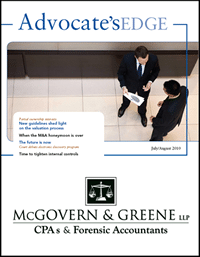 JUL/AUG 2010 Issue of Advocate’s Edge
JUL/AUG 2010 Issue of Advocate’s Edge
Partial ownership interests
New guidelines shed light on the valuation process
Business valuators are often retained to value partial ownership interests. In 2009, the American Society of Appraisers adopted nonbinding procedural guidelines to describe the considerations and procedures that may be used to value partial interests in businesses, securities, and other tangible or intangible property. This article looks at the relevant factors in such valuations, while a sidebar lists items that should be considered in an analysis of the expected holding period for an investment.
The future is now
Court debuts electronic discovery program
In 2009, the Seventh Circuit Court of Appeals launched a program that points the way to some potentially significant changes in the discovery process. The goal of the court’s Electronic Discovery Pilot Program is to reduce litigation costs and time brought on by the widespread use of electronically stored information (ESI). The initial set of guidelines requires that litigation participants address and resolve ESI issues early in the process.
Time to tighten internal controls
The recent economic downturn has provided ideal conditions for occupational fraud. Now more than ever, companies need a forensic expert to perform a fraud risk assessment. Forensic experts typically start their risk assessment with five steps recommended by the Association of Certified Fraud Examiners. This often results in recommendations for internal control upgrades, many of which can be simple and inexpensive.
When the M&A honeymoon is over
Merger and acquisition (M&A) transactions are notoriously difficult to execute. In some cases, sellers and buyers engage in postclosing disputes over previous financial representations and the company’s selling price. A financial expert with M&A experience can help with areas of dispute — such as earnout provisions — and help attorneys draft discovery requests to uncover audit workpapers, consultants’ reports and other documents that shed light on the target’s accounting policies and practices.
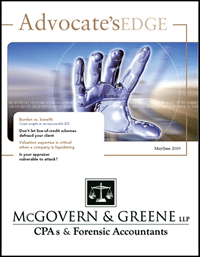 MAY/JUN 2010 Issue of Advocate’s Edge
MAY/JUN 2010 Issue of Advocate’s Edge
Burden vs. benefit
Court weighs in on inaccessible ESI
Attorneys increasingly face discovery requests for massive amounts of electronically stored information (ESI). Parties generally aren’t required to produce ESI that isn’t “reasonably accessible” because of undue burden or cost, but courts can nonetheless order production on a showing of good cause by the requesting party. A recent New Jersey district court opinion examines the factors relevant to the determination of whether such a showing has been made.
Don’t let line-of-credit schemes defraud your client
Companies everywhere need to make an ongoing commitment to preventing occupational fraud. But a weak economy can raise the incidence of fraud as even long-term, trusted employees become financially motivated to steal from their employers. Hard times also typically lead to more “creative” schemes. One that gets little attention, but potentially is extremely damaging, involves a company’s line of credit (LOC) with lenders.
Valuation expertise is critical when a company is liquidating
Whether your client is a financially distressed business or a business buyer that’s considering acquiring a company in bankruptcy, you’ll need the assistance of a valuation expert. An experienced valuator can help owners make informed decisions about their troubled company’s future and maximize liquidation proceeds. And valuators can provide buyers with an accurate picture of the value of bankrupt businesses and their assets.
Is your appraiser vulnerable to attack?
Attorneys who rely on professional appraisers should know about some revisions made by the Appraisal Foundation to its 2010-11 Uniform Standards of Professional Appraisal Practice (USPAP) — generally considered the performance and ethical standards for U.S. real property appraisers. Experts who breach the rules may be vulnerable to attack by opposing counsel.
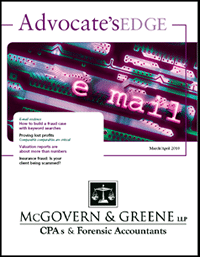 MAR/APR 2010 Issue of Advocate’s Edge
MAR/APR 2010 Issue of Advocate’s Edge
E-mail evidence
How to build a fraud case with keyword searches
Typically, three conditions make occupational fraud possible: motivation, opportunity and rationalization (also known as the “fraud triangle”). By pinpointing the existence of such conditions, experts can better target their investigations. Recently, a team of fraud experts theorized that e-mail communication patterns could reveal a fraud perpetrator’s motivation, opportunity and rationalization. This article discusses the results of their research, while a sidebar explains the “fraud triangle” in detail.
Insurance Fraud
Insurance fraud: Is your client being scammed?
Although businesses potentially can become victim to a variety of schemes intended to bilk insurance companies and workers’ compensation funds, on-the-job injury and property-casualty fraud are the most common. But there are specific clues that fraud experts use to uncover dishonest behavior. In addition to investigating workers’ comp or property-casualty claims, they can help prevent such fraud from occurring in the first place.
Proving lost profits
Comparable comparables are critical
Establishing lost profits, particularly for new businesses that haven’t yet compiled any historical financial data, can be extremely challenging. In such cases, courts sometimes rely on data from comparable businesses. But as a recent New Jersey appellate court case illustrates, true comparability between the businesses is critical. A restaurateur who chose to testify on damages himself, drawing on his prior experience in the restaurant business, learned that his two businesses weren’t as comparable as he’d thought.
Valuation reports are about more than numbers
A lawyer receiving a business valuation report may find it tempting to go straight to the bottom line — the valuator’s estimate of the subject business. But properly written reports contain a number of useful components, such as a definition of the assignment; assumptions and limiting conditions; and valuation methodology. These elements can supply savvy attorneys with information that can be used to support damages and related arguments or to attack an adversary’s proposed valuation.
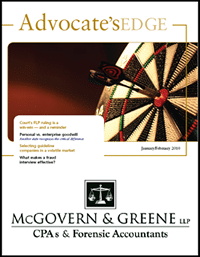 JAN/FEB 2010 Issue of Advocate’s Edge
JAN/FEB 2010 Issue of Advocate’s Edge
Court’s FLP ruling is a win-win — and a reminder
The number of cases challenging the legitimacy of family limited partnerships (FLPs) continues to grow. Typically, these can be classified as either a taxpayer or an IRS win, but one recent U.S. Tax Court ruling is at least a partial victory for both sides. The case involves two separate transfers of interest in an FLP — one made three days before the decedent’s death. This article explains why one transfer passed muster with the Tax Court and the other didn’t, while a sidebar discusses whether the fair market value of the decedent’s assets in a QTIP trust were includible in her gross estate.
What makes a fraud interview effective?
Conducting effective fraud interviews requires knowledge about everything from behavioral psychology to criminal law to accounting and auditing rules. Before they interview a suspect, experts gather documentary evidence, interview other employees, and learn about the potential perpetrator. Armed with that information, the investigator then conducts the interview in a way that minimizes a suspect’s defensiveness. Engaging a forensic expert to perform this critical task could mean the difference between recovery of stolen funds and a successful prosecution, and the perpetrator getting away with thousands — even millions — of dollars.
Personal vs. enterprise goodwill
Another state recognizes the critical difference
The Kentucky Supreme Court recently joined the majority of states that distinguish between personal and enterprise goodwill when valuing a business. Such a distinction can significantly affect divorce settlements when one spouse holds an interest in a closely held business or sole proprietorship — particularly a professional practice. This article looks at how the court came to its conclusion that spouses will receive no share of their partner’s personal goodwill.
Selecting guideline companies in a volatile market
When valuation professionals appraise a business using the market approach, they rely heavily on data from comparable or “guideline” companies. Selecting appropriate guideline companies is always important in preventing over- or undervaluation, and this selection is based on the type of business being appraised. The market approach can be effective in times of general economic stability, but when the value of companies falls dramatically and the economic future is uncertain, guideline company data can be less reliable.
This publication is distributed with the understanding that the author, publisher and distributor are not rendering legal, accounting or other professional advice or opinions on specific facts or matters, and, accordingly, assume no liability whatsoever in connection with its use.
GFAS Advocate's Edge Archives
Expert Forensic Accounting Services
Chicago | Las Vegas
FORENSIC ACCOUNTING
SERVICES
Insurance Claims
Accounting Investigations
Mergers & Acquisitions
Due Diligence Reviews
Dispute Advisory Services
Special Examinations
Contract Audits and Recoveries
LITIGATION SERVICES
Expert Witness Testimony
Commercial Damages
Shareholder/Partner Disputes
Bankruptcy and Insolvency
CPA Malpractice Claims
Contract Disputes
Estate and Trust Disputes
Data Mining & Electronic Discovery
FRAUD EXAMINATIONS

